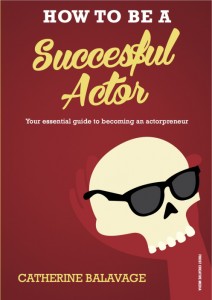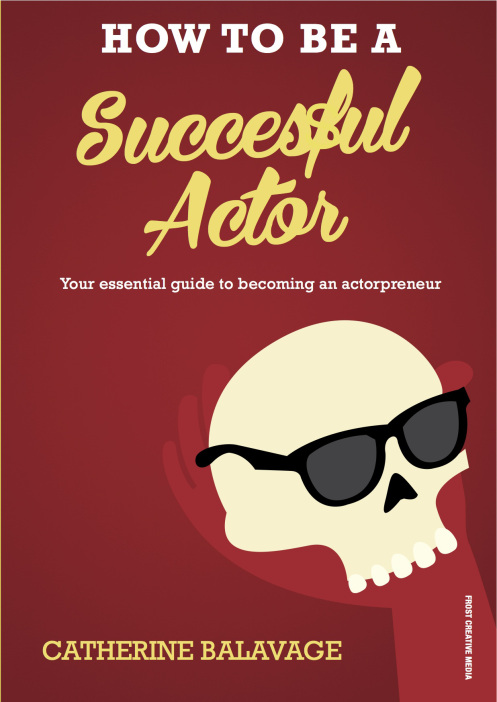 I interviewed a lot of great casting directors, actors, directors and experts in the acting industry for my book How To Be a Successful Actor: Becoming an Actorpreneur. One of those interviews was with Emma Dyson who gives actors career advice for Spotlight, the main casting site for actors and casting directors. Spotlight is also the essential casting site for actors, if you are not in it, you are invisible. An extract from the interview is below. Read it and learn.
I interviewed a lot of great casting directors, actors, directors and experts in the acting industry for my book How To Be a Successful Actor: Becoming an Actorpreneur. One of those interviews was with Emma Dyson who gives actors career advice for Spotlight, the main casting site for actors and casting directors. Spotlight is also the essential casting site for actors, if you are not in it, you are invisible. An extract from the interview is below. Read it and learn.
Emma Dyson works for the main casting website for actors in the United Kingdom, Spotlight. She also does one-on-one talks for Spotlight members to give them career advice.
So tell us about you.
I’ll tell you a bit about my background. I trained as an actor at the Guildford School of Acting in the 1990s and then, having got the training out of my system, I quickly realised I couldn’t be an actor. I probably didn’t have the talent or the perseverance or the backbone. Then I was an agent for six years. Then I left being an agent thinking that I would go into a different career, something entirely different, but every job that I was getting was pulling me back to the business so first of all I was working at my old drama school back at Guildford, I was the personal assistant for Peter Barlow who was the then assistant director, and then I left two weeks into the job because he was leaving. Subsequently a casting director put me in touch with Thea from United Agents, and I was temping at United Agents sort of off and on for about six months which is when I got the job here at Spotlight being the PR manager.
I used to do castings within the agencies and get the Spotlight breakdown and put roles and the actors that fit them together. It was interesting, having worked in an agency, because the first point of contact that you do in casting work is Spotlight. Now I am very happy here as PR manager and I go to the drama schools and talk about acting and Spotlight member benefits. How to get a good CV and photo, what type of letters to write to casting directors, agents. Time and time again they are incredibly green. They are in their final year of drama school and have hardly written any letters to agents or casting directors. They leave thinking ‘Here I am, come and get me!’ it just doesn’t work out like that. It’s really important and I empathise that it is very important to write letters, to hopefully reach your future employer, who will, across the course of your career, become your friends, and keep re-employing you.
 It is such a shock when people leave drama school. They don’t really know what to do.
It is such a shock when people leave drama school. They don’t really know what to do.
I know and it is such a shame. They go to Central, LAMDA and RADA. Those are very central London schools. They get so spoilt for choice because it’s awash with agents and casting directors, it carries the kudos of being at the best drama school. Where I was at Guildford we were terribly cut-off despite the facts it’s only a twenty minute train journey, but, we felt very cut-off. It’s a shame that schools that are not in central London get kind of left out and not thought of. There are some interesting actors in regional schools. The Welsh college is a very good school with a lot of good courses and a brilliant reputation. Conversely Rose Bruford has some really good students and that is in Kent.
I think you have got to train, you have got to workshops, you have got to keep classes going. Try to teach yourself as many skills and techniques as possible because the more skilled you are as an actor the more you should work. I always like the actors who go into musical theatre, straight theatre, film and do a bit of everything, And what we are noticing is that there is more of a vogue for musical theatre and films are being made from those musicals. I know of a few film directors who are making films which are musicals. It is kind of a renaissance or a nod to the 1950s. The MGM sort of musicals. Musicals are very popular.
So learn to sing
Learn to sing if you can, and if you can dance then I think you will probably work all the time.
Daryl Eisenberg, an American casting director, told me two things when I met her: One, you are not special. Don’t think you are more special than anyone else and are just going to make it, and two, whatever is stopping you from getting a job, remove it. So if you can’t dance then learn to dance, etc.
I think that is just a roundabout response to what I just said. If you do just keep yourself as skilled and as tuned in as possible then you will get work. You have to do as much theatre as you can and as much film as you can. Not only that but I extend it to: if you are a London actor or a London based actor see as much art as you can, culturally exploit everything which is on your doorstep. Because I think that tunes you in to everything. It keeps you aware of what is current. You pick up on working trends and that reflects across the arts.
Tell me about Spotlight events,
Yeah, we do events. Being PR manager. ..We did one in October in conjunction with the London Film Festival. I got three casting directors. I got Karen Lindsay Stewart and Lucinda Syson. It was held at the British Film Institute and it was chaired by Pippa, my boss, and myself, it was just about how to become a working actor, keeping your CV up to date, how to get an audition, and also I do seminars where I talk a lot about being a working actor, how to network, all of those things, and at Spotlight offices on every Monday we have Spotlight Mondays where I operate 20 minutes chats with people who are stuck in their careers. They are incredibly popular. They always sell out very, very quickly. And the seminars are sometimes in conjunction with Actors Expo or other bodies. We just hold little seminars in house.
How do you break through?
I think it depends because some actors burn out very quickly, and other actors, they see an opportunity and they become very successful and popular when they are in their forties. So I think it just depends because there is so much reliance on good luck and you have to have a lot of charisma, a lot of talent. But then the rest of it is luck. I think you can make your own luck, but a lot of it is out of your control. Probably one of the reasons that I didn’t become an actor was because I couldn’t stand being in a career with no control.
To answer your question, I think it depends on many things. They have to have a good agent behind them and the rest of it I think is luck.
What is the most common mistakes actors make?
Not being proactive, not writing letters to casting directors. Even with a good agent you should still do your own work. Not looking after themselves, not working out, not eating well, not networking, I think all of these things, the actor has to do that. It is part of their homework.
How many actors are on Spotlight?
Just over 40,000
For the rest of the interview, and great interviews from our acting industry professionals get your hands on a copy of How To Be a Successful Actor: Becoming an Actorpreneur now.
 To train or not to train, that is the question. To paraphrase some little known writer, ahem. It is a debate that has raged on. The truth is, there is no easy answer. Frankly, studying at Cambridge will get you noticed but training at some random never-heard-of polytechnic won’t do you much good. In a recent Mark Strong Acting masterclass I went to Mark made the excellent point that it is not the training that is important, but the confidence it gives. Sometime people who don’t train have a chip on their shoulder, Mark said, much like people who don’t go to university think they missed out on something. It is all rubbish and in fact they did not miss anything at all, but the lack of confidence is there.
To train or not to train, that is the question. To paraphrase some little known writer, ahem. It is a debate that has raged on. The truth is, there is no easy answer. Frankly, studying at Cambridge will get you noticed but training at some random never-heard-of polytechnic won’t do you much good. In a recent Mark Strong Acting masterclass I went to Mark made the excellent point that it is not the training that is important, but the confidence it gives. Sometime people who don’t train have a chip on their shoulder, Mark said, much like people who don’t go to university think they missed out on something. It is all rubbish and in fact they did not miss anything at all, but the lack of confidence is there.





